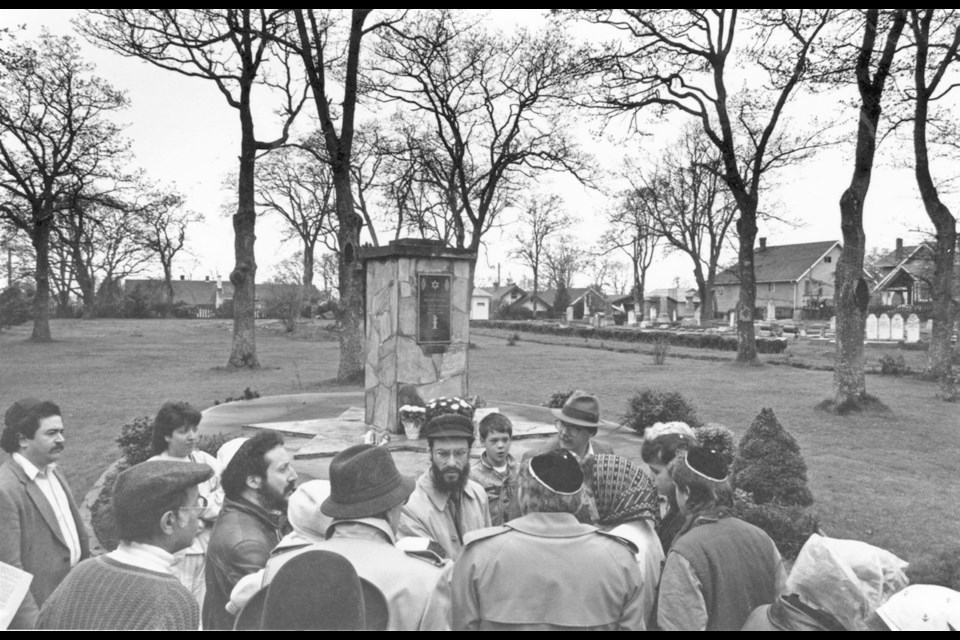Forgetting horrors such as the Holocaust is impossible, so it’s better to consider how best to remember them, say historians and religious leaders with the Defying Hatred Project.
“Japanese Canadians are not about to forget the internment [during the Second World War], Indigenous people are not about to forget colonization, Irish people are not going to forget their history and Jews are not going to forget the Holocaust,” said Prof. Jordan Stanger-Ross of the history department at the University of Victoria.
How to remember is a challenge, however, said Stanger-Ross. “We want to do it in ways that aren’t isolating any group, or that don’t encourage new forms of tribalism or grievance at the same time.”
Stanger-Ross, fellow UVic historian Lynne Marks, political scientist Matt James and Rabbi Victor Reinstein — who served as rabbi of Congregation Emanu-El in Victoria from 1982 to 1998 and is now rabbi of Nehar Shalom Synagogue in Boston — are all part of a Holocaust commemoration on Sunday.
It’s a lead-in to Monday, Jan. 27, which is International Holocaust Remembrance Day. The date was chosen because it’s the day in 1945 when Auschwitz was liberated. More than one million people, mostly Jews, were systematically murdered in gas chambers at the Nazi extermination camp. Monday is also a day for teaching Holocaust awareness in B.C. schools, with material and lessons produced by institutions such as the Vancouver Holocaust Education Centre, the leading Holocaust teaching museum in Western Canada.
During his tenure in Victoria, Reinstein founded Holocaust commemoration events, including the annual international Yam Hoshoah — held in the spring to coincide with the anniversary of the Warsaw Ghetto Uprising, which occurred from April 19 to May 16, 1943 — and the annual commemoration of Kristallnacht, the Night of Broken Glass. On Kristallnacht, which took place Nov. 9 to 10, 1938, Nazi thugs and supporters took part in a rampage across Germany and Austria that targeted Jewish shops, homes and buildings, while police and other authorities stood by.
Historians now recognize it as the first unleashing of mass violence against the Jews and an early signal of the coming Holocaust, which killed six million people, mostly Jews.
Reinstein recalls one Holocaust survivor being asked by a young person what children of subsequent generations should be told. “Tell them not to hate,” was the reply — it’s the title of his Sunday presentation.
Reinstein, who is in Victoria, said in an interview that traumas such as the Holocaust leave permanent psychic scars. “It becomes part of who we are,” he said. “The challenge becomes how to remember in a way that allows us to live and channel the memory and the pain in a way that helps to ensure the source of such pain doesn’t continue.”
Remembrance of events such as the Holocaust and Kristallnacht allows people to honour the dead and the survivors, and to think about how those memories can inform the present and shape the future, Reinstein said. “We want to draw upon those lessons that can, indeed, help us to create a world without hate.”
James said remembering our pasts can be a helpful response when acts of hate occur. Modern politicians and community leaders often respond to an act of hate, such as anti-Semitic vandalism or violence, with statements that deny any connections with their own communities, he said.
“The leader will denounce the act of hate by declaring: ‘This is not us’ or: ‘This is not who we are,’ ” said James. “But there is something weird going on.
“Usually the person doing the act is, indeed, one of us. They got their ideas from somewhere and they are not an entirely alien presence in the community.”
James believes showing solidarity and empathy for a victimized community in a moment when hate is inflicted is necessary and helpful. In the long term, it can also help to engage in self-reflection and education about where the hate originates and continues to reside.
“Sometimes, remembering and learning about history can also be a good way of responding to hate,” he said. “It can help build bridges and make connections.”
Tell Them Not to Hate — Words of Witness and Sacred Imperatives takes place Sunday from 2 p.m. to 5 p.m. at the Victoria Jewish Community Centre, 3636 Shelbourne St.



